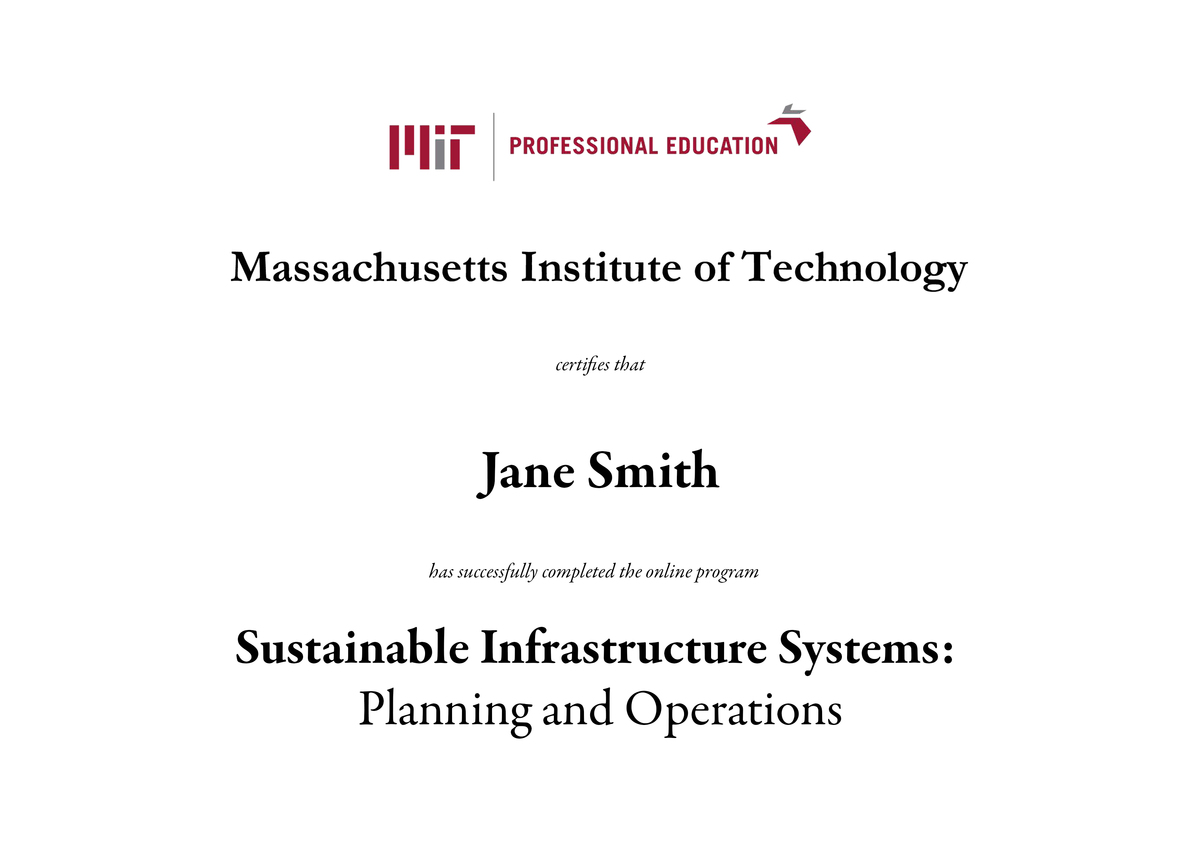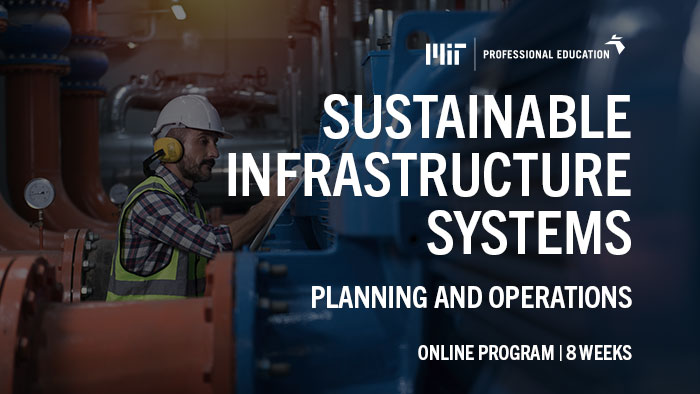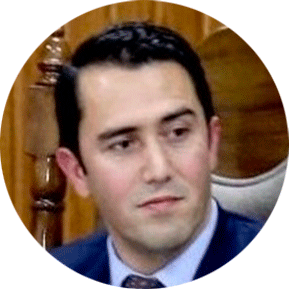This course is part of our Professional Certificate Program in Sustainability and Blended Professional Certificate: Chief Sustainability Officer
How can we conceive and build infrastructure that sustains and adapts for an uncertain future?
In countries around the globe, debilitated infrastructure—or a complete lack thereof—causes outages, puts human safety at risk, and leads to the loss of thousands of working hours and their subsequent economic impact. And as regions around the world deal with the effects of the climate crisis, this new era will require new methods and a new approach to repairing and rebuilding infrastructure in a more sustainable, adaptable way.
$3300
In the US alone, underinvestment in infrastructure will negatively impact GDP, employment, personal income, and global trade, costing each household an average of $3300 per year*.
Source: *American Society of Civil Engineers’ Failure to Act Report
-2.8Gt
Investments in low-carbon, urban transport solutions could reduce 2.8 gigatons* of GHG emissions per year by 2050.
Source: *The New Climate Economy
5x
Investments in renewable energies and infrastructure could create 5 times more jobs* than traditional energy investments in fossil fuels.
Source: *UN Environment Programme
An online course for planning and developing sustainable, adaptable infrastructure
With MIT Professional Education’s online course, Sustainable Infrastructure Systems: Planning and Operations, you will explore systems theory as the basis for analysis, development, and engineering of sustainable, adaptable technological systems. This course will equip you with the knowledge and skills needed to develop modern sustainable infrastructure, from public policy and planning to operations management and data collection.
Throughout this course you will
1.
Examine systems theory
as a tool throughout the conception, analysis, and design of technological systems operating in modern societies and embedded within the natural environment.
2.
Explore metrics and evaluation methods
for determining sustainability of the different components of systems.
3.
Discover life-cycle assessments (LCAs)
and life-cycle sustainability assessments (LCSAs) to identify and develop new methods for boosting sustainability through multi-industry systems.
4.
Map out interactions between components,
identifying feedback and potential unintended consequences, as well as system lock-in.
5.
Compute life-cycle value
using expected net-present value and other sustainability-based value metrics.
6.
Determine water, energy, and agricultural
sector resource linkages in a particular region and extract insights relevant for local policy and planning.
In addition, you will receive a Certificate of Completion
All the participants who successfully complete the online course Sustainable Infrastructure Systems: Planning and Operations will receive an MIT Professional Education Certificate of Completion. Furthermore, participants will receive * MIT Continuing Education Units (CEUs)*.
To obtain CEUs, complete the accreditation confirmation, which is available at the end of the course. CEUs are calculated for each course based on the number of learning hours.
* The Continuing Education Unit (CEU) is defined as 10 contact hours of ongoing learning to indicate the amount of time they have devoted to a non-credit/non-degree professional development program.
To understand whether or not these CEUs may be applied toward professional certification, licensing requirements, or other required training or continuing education hours, please consult your training department or licensing authority directly.

This course is designed for
Professionals and organizations from both the public and private sectors looking to discover a systems theory approach to the sustainable development of infrastructure. This course is designed for professionals from an array of backgrounds and fields, including:
- C-suite executives and mid-to-senior-level managers
looking to develop an understanding of the concepts and key definitions of systems theory and its relation to infrastructure development and engineering.
- Policymakers and development agencies
interested in gaining insights into sustainable infrastructure improvements and development to support economic growth while working toward targets such as the UN SDGs.
- Engineers and technical professionals
committed to understanding the benefits of utilizing technology to develop sustainable infrastructure systems to enhance our global quality of life.
- Consultants
seeking to provide their clients with innovative and sustainable infrastructure solutions for business problems while demonstrating credibility and capability through a respected course.
- Finance leaders and economists
interested in the balance of macroeconomic principles and environmental, societal, and governance (ESG) criteria and investment.
Meet the instructors of this course
Listed in alphabetical order
DR. Afreen Siddiqi
Research scientist, MIT and Adjunct Lecturer in Public Policy, Harvard Kennedy School

Learn more
Siddiqi’s research develops systems-theoretic methods, with data-driven analysis, for novel insights to inform design, decisions, and policy for engineered systems. The methods combine simulation, optimization, and decision analysis. Her recent work has focused on new hydropower, desalination, waste-to-energy, and agriculture systems, and on understanding the systemic interconnections between water, energy, and food security.
PROF. Olivier de Weck
Professor of Aeronautics and Astronautics and Engineering Systems, MIT

Learn more
de Weck is a leader in systems engineering research. He focuses on how complex, man-made systems such as aircraft, spacecraft, automobiles, printers, and critical infrastructures are designed and how they evolve over time. His main emphasis is on strategic properties that have the potential to maximize lifecycle value.
Furthermore, de Weck has recently published a textbook outlining Technology Roadmapping, in both its development and practice, and illustrates the underlying theory of, and empirical evidence for, technologic evolution over time afforded by this strategy. Find more information here: Technology Roadmapping and Development

